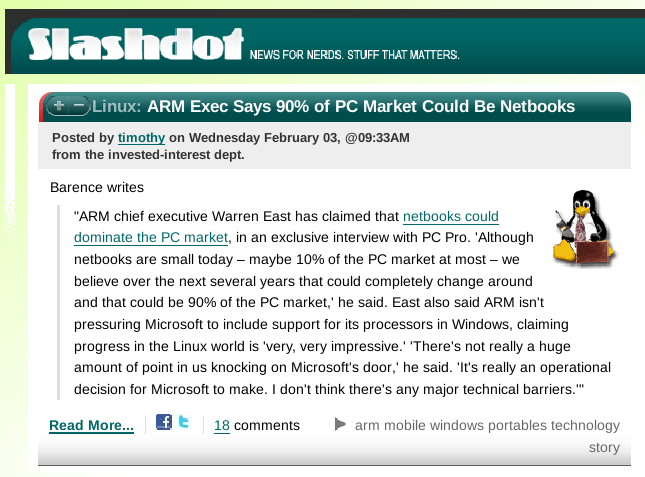
I saw this story
on slashdot about the
ARM CPU
being used on the next class of netbooks. I was really expecting that
Apple would use the CPU on their recently announced iPad. Instead, they went
for a proprietary in-house CPU.
Background
The ARM CPU is already used in devices such as these devices:
There has been some buzz that ARM powered netbooks will appear in a
big way, especially in the netbook space. So far, nothing has appeared.
If it does materialize, then this would be a very interesting
development because these devices'
primary OS is linux
and Microsoft would be hard-pressed to usurp its dominance on that
architecture. Linux runs on a wide variety of CPU architectures,
including ARM; Windows is Intel only.
Nipping Linux-based netbooks in the bud...
Microsoft was already being squeezed by Linux's potential use on
netbook class PCs. In response to the threat posed by these low priced
computers, such as the ASUS eee,
Microsoft reportedly lowered the price and extended
the life Windows XP. This seems to have worked and snipped some of
Linux's newly gained marketshare in the bud. ASUS and other
manufacturers have reverted to using XP, and removed Linux. MS did this
at some cost to them- almost giving the OS away. Some rumors put the
price to regain the marketshare at between $5 and $15 per copy of XP.
That is a far cry from
the $50
to $150 dollars per XP copy that they have been accustomed to getting.
One irony that may come back to bite Microsoft is that is that Windows NT derivatives run on Intel CPU's only. Microsoft phased out support for other CPU architectures beginning with NT4. This was due to Intel's dominant market position. However, WinNT was originally developed for multiple CPU architectures including:
Now, Windows flagship OS currently runs on these architectures: